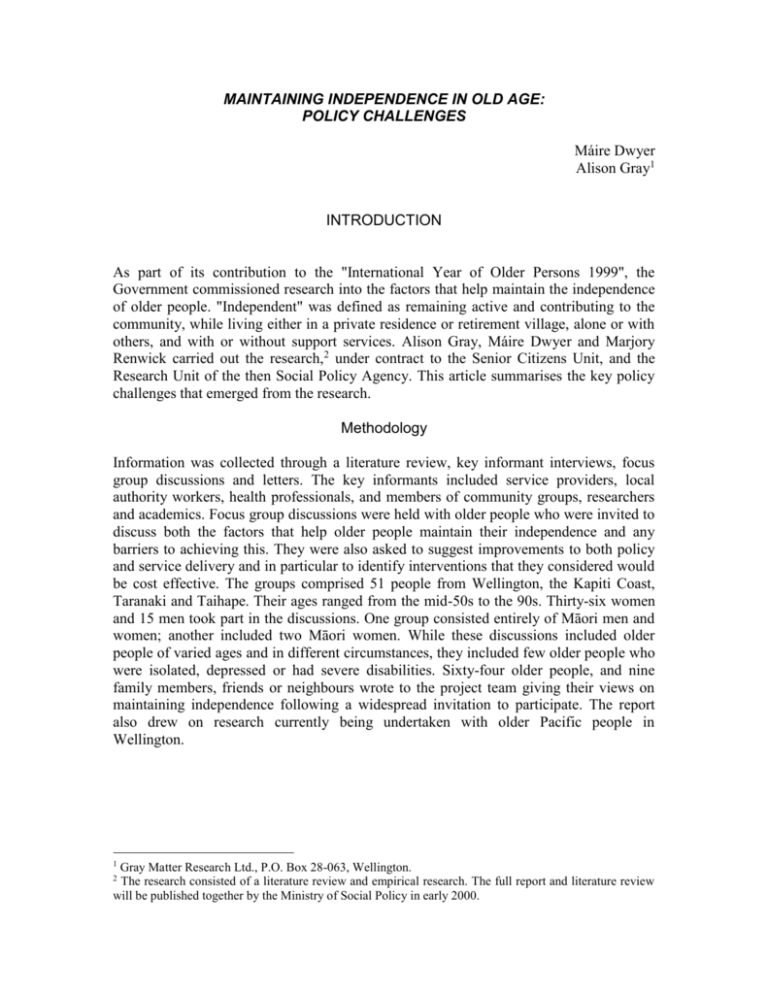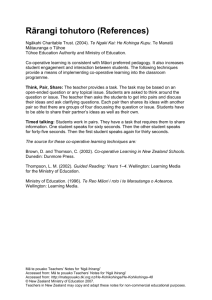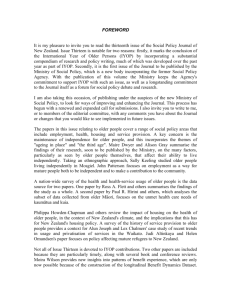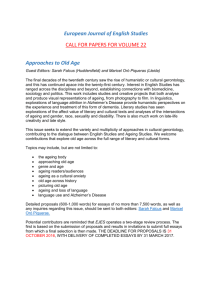maintaining independence in old age
advertisement

MAINTAINING INDEPENDENCE IN OLD AGE: POLICY CHALLENGES Máire Dwyer Alison Gray1 INTRODUCTION As part of its contribution to the "International Year of Older Persons 1999", the Government commissioned research into the factors that help maintain the independence of older people. "Independent" was defined as remaining active and contributing to the community, while living either in a private residence or retirement village, alone or with others, and with or without support services. Alison Gray, Máire Dwyer and Marjory Renwick carried out the research,2 under contract to the Senior Citizens Unit, and the Research Unit of the then Social Policy Agency. This article summarises the key policy challenges that emerged from the research. Methodology Information was collected through a literature review, key informant interviews, focus group discussions and letters. The key informants included service providers, local authority workers, health professionals, and members of community groups, researchers and academics. Focus group discussions were held with older people who were invited to discuss both the factors that help older people maintain their independence and any barriers to achieving this. They were also asked to suggest improvements to both policy and service delivery and in particular to identify interventions that they considered would be cost effective. The groups comprised 51 people from Wellington, the Kapiti Coast, Taranaki and Taihape. Their ages ranged from the mid-50s to the 90s. Thirty-six women and 15 men took part in the discussions. One group consisted entirely of Māori men and women; another included two Māori women. While these discussions included older people of varied ages and in different circumstances, they included few older people who were isolated, depressed or had severe disabilities. Sixty-four older people, and nine family members, friends or neighbours wrote to the project team giving their views on maintaining independence following a widespread invitation to participate. The report also drew on research currently being undertaken with older Pacific people in Wellington. 1 Gray Matter Research Ltd., P.O. Box 28-063, Wellington. The research consisted of a literature review and empirical research. The full report and literature review will be published together by the Ministry of Social Policy in early 2000. 2 THE CONTEXT FOR CONSIDERING INDEPENDENCE OF OLDER PEOPLE As in other western countries, older people are growing as a proportion of the New Zealand population. In 1996, 11.7% of the population (422,667 people) was 65 or over. This proportion is expected to peak at 25.5% of the population in 2050. The most rapid increase will be in the "old old". By 2031, people aged 80 and over are expected to make up 27% of those aged 65 and over. The ethnic composition of this population will become more diverse as the proportion of older Māori and Pacific people increases. Most older people live at home. At the 1996 census, 92% of people 65 and over, and 87% of people 75 and over lived in private dwellings. Ageing can involve decreased mobility and dexterity, decreased strength and stamina, and reduced sensory acuity. Statistically, the probability of morbidity or illness and some disabilities increases with age. Older people are often more affected by, and take longer to recover from sicknesses, such as influenza. On the social side, ageing can involve isolation from family and friends, including the loss of peers. The composition of neighbourhoods may change as older people die or move out and younger families move in. To "age in place" successfully requires planning and often support from services as well as family, and may require physical changes to one's home. Ageing does not occur at a uniform age or rate. While older people receiving institutional care have a greater average level of disability than those who are living independently, there is no unambiguous point of transition. Some people living independently have higher levels of disability than do others who are in institutional care. Most disabled older people, including those with severe disabilities, and high dependency on others, presently live in private households. Important Factors in Maintaining Independence The literature review confirmed that what individuals do, and what happens to them before they become old, is probably the most important influence on independence in old age. Individuals can enhance their chances of retaining independence by having a successful, healthy and active life before and after reaching old age. Financial resources, an active mind, good relationships with family and friends, fitness and health, and good self-esteem are all associated with being able to stay living independently. Even when serious disability or illness occurs, these personal resources and social capital increase choices, and enhance the likelihood that an individual can access services, be supported informally, and stay living independently. From the perspective of habits and confidence, older people are more likely to be active and happy in retirement, if this has been the case earlier in life. There are, however, no guarantees. Old age is probably the most difficult phase of life for which an individual has to plan. Individuals face more uncertainty about key areas of their life when old, than at any other life stage. These include how long they, and their partner, will live and in what state of health. From these areas flow uncertainty about how long they will have the capacity to earn from work, to undertake jobs around the home, to drive and get around unassisted, to see, hear and communicate, and to remain active and motivated. A number of other factors are critical to independence in old age. While the importance of each to individual older people varies, they emerged from the research in approximately the following order of priority: positive attitudes to ageing having adequate income support with personal health needs and needs arising from disability and degenerative conditions having appropriate housing and security access to transport opportunities for recreation, education and use of public amenities, and work. Factors Influencing a Policy Response Our research focus was on factors that support the independence of older people. In drawing up policy recommendations, we melded together the views of the older New Zealanders who took part in the research, our analysis of the key issues that emerged from the research, and the need to take account of factors which will influence the viability and effectiveness of any policy responses. These factors include: the historical context that influences the roles of individuals, families, and the voluntary, private and public sectors research evidence on effective policies and programmes the need for sustainability in all sectors the importance of perceived fairness to policy stability and encouraging contribution, and as far as it is possible to ascertain, the likely impact of the ageing of New Zealand society, technological change and policy trends on the independence of older people in the future. Families and government are the most important players in maintaining the independence of older people. Government expenditure on older people is substantial, particularly in the areas of income support, health and disability services. As the population ages, government expenditure in these areas is predicted to rise substantially. The cost of New Zealand Superannuation has been projected to increase from 5.3% of Gross Domestic Product (GDP) in 1996/97 to 10.7% in 2051, and the cost of health and disability care to rise from 5.9% to 11% of GDP over the same period. THE POLICY ISSUES A number of key policy issues emerged from the research, and these are discussed below. These issues include: positive attitudes towards older people; income; support with health and disability needs; housing and security; transport; recreation, education and public amenities; work. This section concludes with a comment on the role of local government. Positive Attitudes Positive attitudes towards older people make a difference to their independence. A theme throughout the literature, and in the focus groups, letters and interviews, was that "costs" to society flow from the view that older people are "dependent" and a burden to society. Where older people are viewed positively rather than assumed to be dependent, they are more likely to: play active and useful roles in society; be assertive and confident in looking after their own needs and contributing to society more generally; and have good mental health and be less at risk of isolation and depression Positive attitudes are also more likely to mean that: services and amenities take account of the needs of older people and support their independence; and young and old recognise their common interests, rather than being divided. Our overall impression was that more can be done in all sectors to improve attitudes towards, and responsiveness to, the needs of older people. Key informants and older people reported that doctors and other service providers could do more to avoid treating older people as dependent. As older people become a larger proportion of the population, their numbers and consumer power will add traction to positive attitudes set in place now. The older people in this study appreciated private firms who were responsive to their needs. They cited local firms that delivered goods free or made special arrangements for older customers, or who sponsored local events through cash payments or by providing goods and services. The two most-mentioned areas where services were not seen to be responsive to the needs of older people were the new technologies, particularly automated banking and telephone systems, and the reduction in face-to-face contact. Income Concerns about money constrain independence, both as a result of the "worry" factor, and because not having enough money constrained activities such as outings and house maintenance. In the literature, remaining active and good living conditions were both associated with increased independence. Financial insecurity was a major issue for many of the older people who took part in this research. They were particularly concerned about the unpredictability of costs, especially for surgery and long-term care, and the erosion of their investment income through falling interest rates. NZ Superannuation, a universal payment to all retired people, is designed to provide for a modest standard of living, and not to provide for all of the additional costs of illness and disability that occur with increasing frequency as people age. Assistance with these additional costs for people at home is provided through a range of programmes tightly targeted on the basis of income. Assistance with the costs of residential care is subject to an income and assets test. The study provided an insight into the lack of incentives to save for retirement, and also the incentives to disguise savings or not to divest assets. Several older people discussed the lack of good products to protect the value of savings and to enable release of home equity. Others expressed resentment at the low level of publicly funded support for services for older people with modest savings. They were particularly resentful at the erosion of their personal assets to pay for long-term care. There is also evidence of retirement planning services specifically advocating the setting up of trusts to avoid the divestment of assets when needing long-term care. Over the medium term, the researchers consider it is important to ensure that funding policies for home-based and long-term care take account of the desire of individuals and couples to manage the risk of needing substantial amounts of care. This means exploring the impacts that current targeting has on incentives to save, and incentives to disguise savings in retirement. This is consistent with the OECD perspective that containing the costs of ageing for governments requires consideration not just of sustainability for government, but also for individuals. Support with Health and Disability Needs The most critical issues that emerged for central government in doing better on supporting the independence of older people in this arena were: the need to improve the co-ordination of health, disability and welfare services for older people; and the need for a comprehensive strategy to train, support, and relieve carers. Having speedy and affordable access to health services was a major concern for older people, many of whom wrote or talked about their anxiety about having to wait for health care or not having sufficient post-operative or long-term support. The lack of integration of funding for acute medical or personal health needs with funding for mental health or disability support has been identified as a barrier to maximising independence at home. Delays in accessing operations such as hip replacements can mean more demand on support services at home. Improved integration should result in improved cost effectiveness as well as improving the quality of life for older people. A further challenge is to find ways to better integrate different income support mechanisms, the disability allowance for example, with the health and disability services. Greater independence of older people may also be well served by a more coherent approach to supporting voluntary and community services. These agencies reported some difficulties in accessing sufficient and ongoing funding, and difficulty meeting the resource requirements of contracts. The literature review, interviews, focus group discussions and letters confirmed the importance of families as carers of older people with disabilities or poor health. These sources also agreed that the support provided to carers is patchy and often insufficient, A more explicit strategy to support carers, acknowledge their need for training and other supports, and recognise time off as a right, will enhance the capacity of families to provide care. It is also likely to improve the quality of care. Older people, older carers and family members all sought more generous support for family carers both directly, and through the provision of support services. This could be a win-win opportunity. It may be possible for government to manage the future fiscal risk of increasing take-up of the residential care subsidy, and improve the health status of older people, by generating more goodwill with families and community organisations who are partners in care provision. This could also lead to more flexible and responsive opportunities being established at a local level. Housing and Security After health and income, housing was the main concern of older people. Many identified a lack of affordable rental or ownership housing options in their community. They also expressed a need for a range of supported accommodation, especially for low-income people who could not afford to buy into commercial retirement villages. Awareness of security needs was common. Many had taken steps themselves to increase their security by installing security lights, personal and house alarms, and smoke alarms. The biggest policy challenge in housing is to find ways to ensure that older people with limited means can access a wider range of housing choices. In particular, there appears to be a need for more choices that provide for degrees of supported or assisted living than currently exist, at an affordable price. A lack of research means it is impossible to know to what extent this perceived "supply gap" is a persistent problem, or a temporary lag. The trend towards increasing diversity in housing for older people, and in particular housing that includes assisted living, is expected to continue. It is consistent with the growing numbers of older people living alone, and the trend away from large-scale, institutional care. One author argues that, in the future, the distinction between care at home and in an institution will blur to the point where "the very notion of 'institution' for people who live in housing where long-term care is available, will become an anachronism" (Kane 1996). This suggests a need to consider the extent to which differences in the subsidy regimes and service boundaries between care provided in homes and care provided in residential settings are, or will be, a barrier to optimising living arrangements. Well-maintained and safe homes provide health and quality-of-life benefits to older people. There are a number of initiatives that assist older people to maintain and modify their homes; but there are also barriers, in particular, for accessing finance. Policy addressing this area, perhaps using equity as collateral for loans, could be cost effective through the resultant health benefits. Transport Concerns about transport were raised almost as often as concerns about housing. Lack of accessible, affordable transport isolated older people in their own homes. It limited their access to health services, reduced their ability to do their own shopping and obtain personal services, and reduced their opportunities for social interaction. Many found it demeaning to have to ask for help; others had few people on whom they could rely. For many older people who do not or cannot drive, individual taxi services are not affordable. Subsidies through the Total Mobility Services are severely restricted. While sheer numbers of older people, and perhaps their increased concentration in certain areas, may generate enough demand to ensure public transport is not just viable but regularly available, this cannot be guaranteed. A "hands off" approach to these policy areas may expose central government to too much risk. Poor transport provision and limited local amenities can have immediate detrimental effects on the standard of living of older people, and is likely to flow on to the public sector as premature needs for acute health services, home-based services and residential care. The links between public transport, local amenities and health need to be better understood, particularly in the light of the proposals in Better Transport, Better Roads (Ministry of Transport 1998), which will place responsibility for subsidising transport at the regional authority level Recreation, Education and Public Amenities Many of the recreation and education activities enjoyed by older people are provided by community groups, usually with some support from government funding agencies or local authorities. Participants in the research appreciated the support they got, but did not always appreciate the effort they had to put in to obtain and account for relatively small grants. This study confirms that many community groups and voluntary agencies rely on small grants or contracts from government or quasi government organisations to keep going. It also revealed that the viability of many of these organisations is precarious. Both paid and unpaid coordinators spend a disproportionate amount of their time applying for funds and meeting accountability requirements. Few are able to plan ahead with any certainty. Work Enabling older people to stay in work is likely to be more important in the future and has been signalled with the Human Rights Act amendment that prohibited compulsory retirement on the basis of age. Relatively few of the older participants in this project were in paid work, although a large number were active in a voluntary capacity. Some were feeling pressured by the demands of voluntary work and were concerned that changes to the retirement age would reduce the pool of voluntary workers. Changes that make it easier for older people to work, and support them when they do, are likely to be good for the economy as well. Economic growth levels may be higher with provision for more older, skilled workers to remain in the workforce. This may to mean having flexible approaches to training and retirement, and individuals being able to make different choices around hours of work. A Comment on the Role of Local Government This study did not review local government policies to any great extent, but two trends were noted. Firstly, older people were generally positive about and appreciative of improvements at the local level to make amenities suitable for people with impaired mobility or other disabilities. They acknowledged the benefits to their independence. On the other hand, in many areas, local authorities were reducing their involvement in services that have been important to the wellbeing of older people, such as libraries and pensioner housing, or introducing user charges. Pressure to constrain rates increases, which many older people would support, is leading to councils pulling back on social support provision. The activities of councils appear to vary considerably. Local authority policy will be important to the independence of older people in the future. Local authorities have a limited range of funding sources available to them, and the most common, rates and user charges, are not sensitive to affordability concerns and can fall heavily on older people. Thus the risk if local authorities have greater responsibility for funding services such as transport in the future, is not that the local authority will be unwilling but that older people, and other residents, will be unable to pay. This may increase the disparities in transport and amenity provision in different areas of the country. CROSS-SECTORAL ISSUES Key cross-sectoral issues included: co-ordination and partnership, research, addressing Māori issues, building a long-term consensus on critical issues. Co-ordination and Partnership Older people were aware that government on its own cannot achieve successful ageing. They were quick to acknowledge the part that individuals must play in maintaining their own health and wellbeing. At some point, though, most older people do need some support, and while this may be funded either through central or local government, it has to be delivered locally. This requires co-operation at all levels and a broad strategy on ageing. This would provide an opportunity to build a positive, longer-term approach to the ageing of the population that was broadly regarded as sustainable and fair. Flexibility and partnership may well prove to be the best way to manage the fiscal risks of an ageing society. The desire for improved co-ordination between health and welfare agencies and a stronger partnership with community groups has already been discussed. Many participants in the research were frustrated by the division of responsibilities between central government agencies, and between central and local government. For example, one group identified health and wellbeing benefits from a recreation and home-visiting programme, but they were not eligible for any health funding. Others talked of the frustration of trying to obtain services for clients when funding came from different sources. As one person commented: "Much of supporting independence has to happen locally. It is about people staying in touch, going out and being part of the community." Research This report and others have identified that problems such as poor housing, inadequate support for family carers, and a poor transport infrastructure can translate into higher costs in other areas, particularly health and ACC. The paucity of New Zealand research investigating the links between policies and independence for older people was one of the factors leading to this research. We see a need for further policy-oriented research that cuts across departmental and local and central government boundaries, and a commitment to programme experimentation and evaluation. The inclusion of the impact of an ageing population as a priority area for the Public Good Science Fund is likely to lead to more such research, however the issue requires more than just impact analysis. At the programme level, it may be useful to consider overseas initiatives such as the Better Government for Older People programme in the UK, a national research programme that includes voluntary organisations, universities and government. Funds are available for local level pilot programmes that cover not just social care but health, education, planning and leisure issues as well. Addressing Māori Issues While Māori generally have a positive view of ageing and accord older people status and respect, the economic situation of older Māori people is often poor. With disproportionately high levels of unemployment amongst younger Māori, some are not well placed to both care financially for older family members and to plan for their own future needs. The expected increase in the number of older Māori people has policy and resource implications, particularly in the provision of health services and housing. While several positive initiatives are already in place, they need to be augmented and supported by long-term strategies and adequate resources. Building a Long-Term Consensus on Critical Issues Governments in the future will face significant risks if population ageing results in fiscal costs that are not sustainable, and the population is then divided between the young and a growing voting block of alienated older people. A long-term commitment, across political parties, will enhance the ability of future governments to ensure maximum independence for older people, at a sustainable cost. The two most expensive items of government expenditure on older people, retirement income and health and disability care, are contested across political boundaries. The consequence of this is an uncertain environment for older people, and for younger people planning for their old age. The uncertain policy environment may detrimentally affect savings levels and the development of new services, such as alternative housing options. The independence of older people, and a sustainable environment for managing an ageing population, could be greatly assisted by a "de-politicisation" of at least some core elements of these major policies. SELECTED BIBLIOGRAPHY Abbott, M. and P. Koopman-Boyden (1994) "'Older New Zealanders - Who Cares?' A report on a survey", Mental Health News, Autumn. Dwyer, M. and A. Gray (forthcoming) Factors Affecting the Ability of Older People to Live Independently: A literature review, Ministry of Social Policy, Wellington. Gray, A., M Dwyer and M Renwich (forthcoming) Factors Affecting the Ability of Older People to Live Independently: The final report, Ministry of Social Policy, Wellington. Health Funding Authority and Ministry of Health (1998) Disability in New Zealand: Overview of the 1996/97 surveys, Wellington. Hennessy, P. (1996) "The growing risk of dependency in old age: what role for families and for social security?" paper presented to ISSA/European Commission European Conference Adapting to new economic and social realities: What challenges, opportunities and new tasks for social security? Aarhus, Denmark, 19-21 November. Investment Savings and Insurance Association of New Zealand Inc (1998) "A wake-up call: The ISI report on Retirement Savings" June. Kane, R. A. (1996) "The future of group residential care" in Caring for frail elderly people: Policies in evolution. Social Policy Studies No. 19, p.93-103, OECD. Ministry of Transport (1998) Better Transport, Better Roads, Wellington. National Health Committee (1998b) The Social, Cultural and Economic Determinants of Health in New Zealand: Action to Improve Health, National Health Committee, Wellington, June. National Health Committee (1999) Health and Disability Services for Older People, National Health Committee, Wellington, March. OECD (1996) Caring for frail elderly people: Policies in evolution, Social Policy Studies No. 19, Paris. Older People's Health Forum (1998) Key outcomes for the health of older people in New Zealand: Recommendations to the Minister of Health. Richmond, D., J.Baskett, R.Bonita and P.Melding (1995) Care for older people in New Zealand, a report to NACCH and DSS. Senior Citizens Unit (1996) Issues papers for the Minister for Senior Citizens, Department of Social Welfare, Wellington, October. St John, S. (1999) "Retirement policy issues that we are not talking about" paper to the NZ Association of Economists Annual Conference, Rotorua. Te Pūmanawa Hauora (1997) Oranga Kaumātua: The health and wellbeing of older Māori people, Te Puni Kōkiri, July. The Prime Ministerial Task Force on Positive Ageing (1997a) Facing the Future: A Strategic Plan - The Final Report, July.






